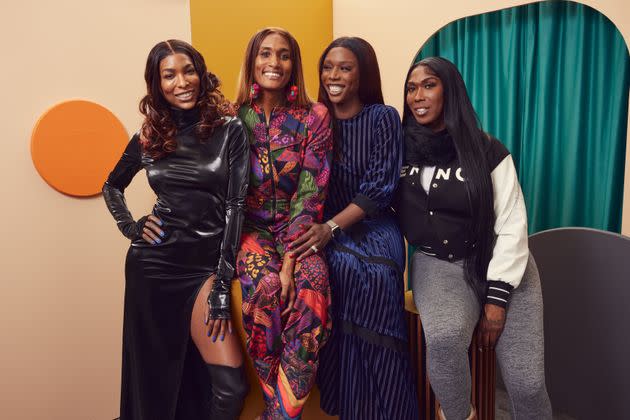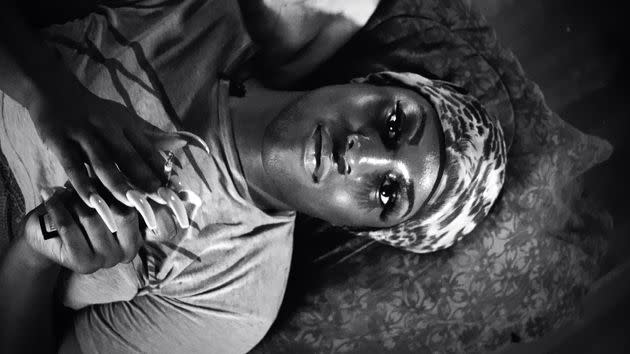New Documentary Offers Gritty And Intimate Look At Black Trans Sex Workers’ Lives
- Oops!Something went wrong.Please try again later.
D. Smith never set out to be a filmmaker. For years, the Florida native enjoyed major success in the music business as a producer and songwriter, collaborating on projects with Lil’ Wayne, Katy Perry and other artists.
All of that changed, however, when Smith came out as a transgender woman in 2014. Suddenly, she says, her opportunities in the recording studio ground to a halt, and she lost her home and her car as a result.
Amidst that professional upheaval, however, Smith bought a camera and quietly began making plans for her latest project. Her new documentary, “Kokomo City,” offers a thoughtful and startlingly intimate look at the lives of four Black transgender sex workers ― Daniella Carter, Koko Da Doll, Liyah Mitchell and Dominique Silver ― in New York and Georgia. The film, shot in stylish black-and-white, opened in theaters Friday after premiering at the 2023 Sundance Film Festival in January.
“I had no intentions on being the director of this film, but it worked out that way,” Smith told HuffPost in an interview. “I asked maybe five or six directors to do it. I’m like: ‘Hey, I got this great idea. You want it? Here you go.’ I saw it as clear as day. Everybody else saying no allowed me to be the director.”

Filmmaker D. Smith (second from left) with "Kokomo City" stars Dominique Silver, Daniella Carter and Koko Da Doll.
The music industry’s rejection still weighed heavily on Smith as she began work on “Kokomo City.” That “definitely not entitled” approach, she said, helped her establish a jovial rapport with the sex workers in the film.
“I was in a really low place in my life, so I had this demeanor that they were helping me, and I wanted to help them as well by telling their stories,” she said. “I was very transparent about what the process of making this film was going to look like. It’s not going to be glam. There’s no fancy lighting person, no hair and makeup. It’s just me. And they were drawn to that.”
She went on to note: “They were drawn to the fact that they didn’t have to worry about the politics of being in the LGBTQ community or of being trans. It’s very stressful, very taxing, actually. A lot of the rules and regulations that we have dehumanizes us.”
Still, “Kokomo City” is being released as violence against the transgender community is at an all-time high, and not surprisingly, the film finds its subjects sharing moments of trauma and tragedy. In one of the film’s opening scenes, Mitchell recalls spotting a loaded gun beside the bed of a client just as she’s about to have sex with him.

Liyah Mitchell in "Kokomo City."
Sadly, that reality was emphasized when Koko Da Doll ― also known as Rasheeda Williams ― was fatally shot in April, just weeks after appearing at the film’s Sundance premiere.
But Smith was adamant that “Kokomo City” depict Black trans sex workers as more than just victims and is quick to highlight the joy and occasional humor of her subject’s private lives. She also interviews a number of trans-attracted men who have been involved with or, in some cases, had lengthy romantic relationships with the women.
After its Sundance premiere, “Kokomo City” was warmly embraced by critics, who praised the film’s vérité approach to an often-dehumanized subset of the LGBTQ+ community. The Washington Post called the film a “meditation on masculinity, femininity, what constitutes pleasure, and the bitter price of personal and social denial,” while The Hollywood Reporter praised Smith for “stepping into relatively uncharted territory with grace and courage.”
Smith is, of course, heartened by the success of “Kokomo City” thus far. Ultimately, she’s hopeful the film who help humanize a derided and much-overlooked subset of the LGBTQ+ community, too.
“Even as a trans woman, I was completely unaware of the things that sex workers and their clients go through,” she said. “All of that happens because people are not able to be who they are. That’s what it boils down to at the end of the day. And once you watch this film, you really don’t want anything to happen to the girls.”
Watch the trailer for “Kokomo City” below.
